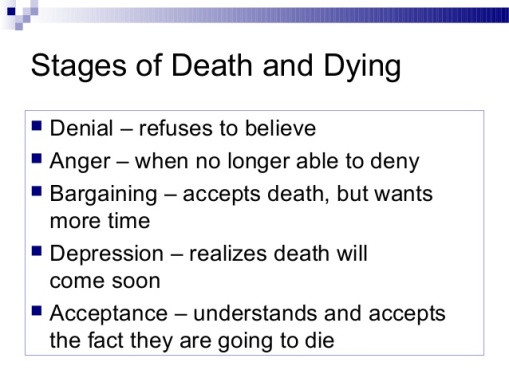QUICK REVIEW:
Death and Dying:
- Death is the final stage of growth
- Experienced by everyone and no one escapes
- Young people tend to ignore death
- Elderly begin to think about death
Terminal Illness
- Disease that cannot be cured and will result in death
- People react in different ways
- Some believe death as a final peace
Stages of Death and Dying:
- Anger, can no longer deny death
- Bargaining – accepts death but wants more time
- Depression, realizes death will be soon
- Acceptance, understands and accepts death
- Dignity and Respect in Death
- Death is a part of life
Elisabeth Kubler-Ross (1969) brought the subject of death into the open with her observation that those facing impending death tend to move through five broad stages:

- Denial: The initial stage: “It can’t be happening.”
- Anger: “Why ME? It’s not fair!” (either referring to God, oneself, or anybody perceived, rightly or wrongly, as “responsible”)
- Bargaining: “Just let me live to see my child(ren) graduate.”
- Depression: “I’m so sad, why bother with anything?”
- Acceptance: “It’s going to be OK.”
Theories of Aging
There is no single way to age successfully.
- Cellular Clock Theory: All humans have cells, the “clock” is the number of regenerations and divisions cells can undergo before cell growth slows and eventually stops.
- Wear and Tear Theory: Effects of aging are caused by damage done to cells and body systems over time essentially being “worn out” due to use. Once they wear out, they can no longer function correctly.
- Free-radical Theory: Organisms age because cells accumulate free radical damage with the passage of time.
References:
Bernstein, D.A. & Nash, P.W. (2008). Essentials of psychology (4th ed.) Boston: Houghton Mifflin Company.
Feldman, R. (2013). Essentials of understanding psychology (11th ed.). New York, NY: McGraw-Hill.
Friedman, H.S. & Schustack, M.W. (2012), Personality: classic theories and modern research (5th ed). Boston: Pearson Allyn & Bacon.
McGraw-Hill.McGraw Hill Higher Education (2013), The McGraw Hill Companies, Inc.
Ryckman, R. M. (2013). Theories of personality (10th ed.). Mason, OH: Cengage Learning.
Science Clarified, Real Life Biology, Vol. 3 – Earth Science, Vol. 1/Instinct and Learning

read understood
LikeLike
Read and understood
LikeLike
Read, watched, and understood. Great topic for class discussion
LikeLike
Read, watched and kind of understood.
LikeLike
Read and understood the reading but the video was hard to understand. Like many said its not a fun topic to talk about but is definitely a part of life
LikeLike
Read and watched Death is a topic no one wants to discuss about until it’s time to go. We bury it so deep in out heads we forget that it even exists.
LikeLike
This is a very touchy subject for me and it take me back to 4 years ago watching my grandpa dying from prostate cancer, my family was in a deep stage of denial and I was the only conscious one. They wouldn’t even have hospice care in place because to them they were killing him. Long story short, is it human to see someone suffer because you want him or her to stay with you?
Death to me should be a peaceful passage between life and the next life and I kind of agree with Jung
LikeLike
Read, watched, and got it. Death is a hard subject to really grasp as a mortal, living being.
LikeLike
Read and watched.
LikeLike
Read and understood. Death is the one part of life that most people tend to ignore, not think about it or disregard. If only we actually knew what happened when we died. I think death is one of the most misunderstood things in life.
LikeLike
I’ve read and understand partially.
I liked that Carl Jung said its best to live on because nothing really stops, even our minds tend to not believe an end, I was just confused about the last sentence when he said “if you think along the lines of nature, then you think overweight”
LikeLike
Read and understand. understood Carl Jung as well
LikeLike
This theory help to understand how people feel when they are getting older
LikeLike
read and understood, death is something we can’t escape we all will one day go through it.
LikeLike
Read and understand. I agree with the final stage of death because of what matters no one can escape death.
LikeLike
Read and mostly understood. People view death differently: some view death as peace, some people believe in the afterlife, and others try to avoid it.
LikeLike
Read this, Carl Jung says we should regard death as being a goal and that older people should look forward to the next stage as if they had to spend centuries, live onward and look forward to the great adventure that is ahead. That is very clear
LikeLike
Read and mostly understood. I agree that some people view death as a final peace because some people find life so overwhelming that they are calm when accepting death since they think death would bring them peace and set them free.
LikeLike
Read and Understood
LikeLike
I read and most understood. I agree with Carl Jung the he says that death is inevitable and to think otherwise is to live in denial (or against one’s instincts).
LikeLiked by 1 person
*mostly
LikeLike
i read and understood that there are different processes in which it takes people to accept death and I agree that young people usually disregard death.
LikeLiked by 2 people
Carl Jung is a deep guy ! “Ignore death and don’t look back you’ll die before your time” ! very very deep !!!
LikeLiked by 1 person